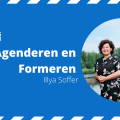In our interview series “Planning and Forming” we speak to experts from various sectors about the issues in their sector, the ways in which they are trying to put them on the agenda in the upcoming coalition agreement and their view of the new House of Representatives. This edition we speak to Marije Hulsbosch
Marije Hulsbosch is manager in & external communications at the MBO Council. The MBO Council is the trade organization of schools in secondary vocational education.
Was the MBO Council satisfied with the election results?
We are satisfied with every election result because we love every politician equally. Of course, we would have liked it if more people with a secondary vocational education background had come to the House of Representatives.
What are the most important issues for your sector?
There are three important issues for secondary vocational education:
- A strong vocational route: This route, a collaboration between VMBO, MBO and HBO, is necessary to train sufficient professionals. Young people must be able to easily continue their education within this career route.
- The social domain: vulnerable groups also need every opportunity to learn a profession and thus be able to provide their own income in order to build a meaningful life.
- Lifelong development: the rapidly changing labor market not only requires good initial education, but also sufficient opportunities to retrain or learn during your working life. It is important that people remain flexible and can switch when necessary. The corona crisis, for example, underlines the necessity of this even more. That is why, in our opinion, lifelong development is very much of the present and of the future.
In addition, the qualification of citizenship requires special attention. Personal development is an important part of every education in secondary vocational education: young people deserve to be given the opportunity to develop into critical citizens. It is the period in which young people mature, participate, learn about democracy, learn about fake news, etc. Sufficient attention must be paid to this and that it must remain so. This issue is not included in the election campaign, but in addition to training for a diploma and lifelong development, it is the core of secondary vocational education.
“It is the period in which young people mature, participate, learn about democracy, learn about fake news, etc. Sufficient attention must be paid to this and to continue to be paid.”
In what ways have you tried to incorporate these issues into politics?
We have as usual lobby invested in personal contacts and highlighted our commitment in a letter and pamphlet. What we have added is the website that is freely accessible to everyone www.mbohelden.nl, the public-friendly translation of what we stand for in secondary vocational education. To start a movement you need more than just members of the House of Representatives. You also need society to recognize and support what you are trying to do as an MBO. This also makes us proud of MBO. And that turned out well, as far as we are concerned.
What should remain the same for the next 4 years?
Over the past 4 years, we have been successful in communicating the value of MBO for the economy and society to various governments and parties. We have built up a good relationship with them, also on a regional level. In addition, the quality of education at secondary vocational education has greatly improved. This appreciation and quality is something we would like to at least maintain and would rather continue to improve where possible.
What needs to change in the next 4 years?
It is important that we see vocational education as an investment for the development of society and the economy. By investing in the public sector, you invest in the people and therefore in the society and labor market that you want to be. For example, with vocational education we keep people agile on the labor market, which benefits society as a whole. In addition, it is important that we look at how we make vocational education future-proof, primarily for the benefit of our students.
Do you think your sector is well represented in the House of Representatives?
Almost 50% of our working population has an MBO diploma. But you don't see that reflected in the composition of the House of Representatives. There must be a better reflection of society in politics. Many steps are being made in terms of diversity in terms of, for example, gender, origin and religion, but not so much about diversity in terms of education.
Our experience is that Members of Parliament often have little idea of secondary vocational education. Sometimes there are working visits where Members of Parliament experience how interesting and versatile MBO is. By better reflection and diversity in terms of education, the overall image of MBO can be improved even more.
How do you see the future regarding politics in the Netherlands?
What we at the MBO Council hope is that lifelong development, which has been talked about for a long time, will now really get off the ground on a structural basis with concrete steps. This is a building block for the development of our prosperity, both from the perspective of the economy and society. There are still too many people who cannot participate and are left on the sidelines, but by structurally incorporating lifelong development through politics, you give everyone a chance to participate in society again.
MBO must be cherished, for young people, but also for adults.





